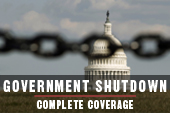Senate Minority Leader Mitch McConnell (R-KY) explained his major budget goal on Wednesday: Continue to cut government spending.
 In announcing a bipartisan deal to reopen the government and raise the debt ceiling through early next year, McConnell tried to refocus a debate about the budget that had meandered into a futile skirmish over Obamacare.
In announcing a bipartisan deal to reopen the government and raise the debt ceiling through early next year, McConnell tried to refocus a debate about the budget that had meandered into a futile skirmish over Obamacare.
Democrats want to use the additional weeks of negotiation to get rid of the $1.2 trillion in automatic sequestration cuts from the 2011 Budget Control Act. McConnell, however, wants to block that, vowing to protect a measure that Republicans and Democrats alike have demonized for its meat axe-like chops into the Pentagon and domestic programs.
McConnell considers the cuts – a byproduct of the failed super committee – to be a hard-won triumph.
“For the first time since the Korean War, government spending has declined for two years in a row,” he said on the Senate floor Wednesday. “This legislation is the largest spending reduction bill of the last quarter century and the largest deficit reduction bill since 1981 that didn’t include a tax hike. Preserving this law is critically important.”
This was more than an attempt to spin a victory out of a humiliating strategic defeat that killed public perception of the GOP, which has now sunk to 28 percent, the lowest reading in more than two decades, according to the Gallup Organization.
RELATED: CAN A SPLINTERED GOP PICK UP THE PIECES?
Here’s why this matters: McConnell is trying to redirect the Republicans back toward winning issues. Polling shows the GOP is split on abortion, gay marriage, and, most recently, the botched move to shut down the government in order to gut Obamacare.
But Republicans are united and eager to cut federal spending, with 41 percent of GOP voters saying their party is “about right” on spending and 46 percent saying their party could be even more conservative, according to the Pew Research Center.
IS SEQUESTER THE STATUS QUO?
Before the sequester was implemented, House Budget Committee Chairman Paul Ryan (R-WI) and House Armed Services Committee Chairman Buck McKeon (R-CA) wrote an editorial last year saying that the cuts would cripple the military.
“There is strong bipartisan agreement that the sequester is bad policy and should be replaced,” they wrote for RealClearPolitics.
McConnell now seems to be arguing that sequestration, while not ideal, is acceptable.
By defending the sequester, McConnell is defending the status quo. Just as Republicans saw in recent weeks with the 2010 Affordable Care Act, it is extremely difficult to undo the status quo.
The economy has already priced in the sequester, while the threat of a default – if the $16.7 trillion debt ceiling is not raised – would wreck the economy. The downside risks to the GOP of holding firm on the Budget Control Act are comparatively minimal.
It’s unclear whether other major Republicans will operate from the same playbook. Even in defeat, Sen. Ted Cruz (R-TX) – who helped instigate the shutdown over Obamacare – was unapologetic, vowing to continue the fight.
The approved Senate deal modestly tweaks the Affordable Care Act, requiring the verification of incomes for individuals who receive government subsidized health insurance. Cruz still believes that the law might have been stopped.
“I would point out that had Senate Republicans united and supported House Republicans, the outcome of this, I believe, would have been very, very different,” he said. “I wish that had happened, but it did not.”
Cruz and his Tea Party brethren still see the fight pertaining to Obamacare, rather than the broader question of government spending.
“You want to know what this fight is about?” Cruz said in a statement this morning. “It’s about one thing. It is about all of the people across this country who are right now facing terrifying decisions because they’re losing their health care, they’re losing their jobs, they’re being left in the cold, and sadly, the United States Senate has said Washington will do nothing.”

